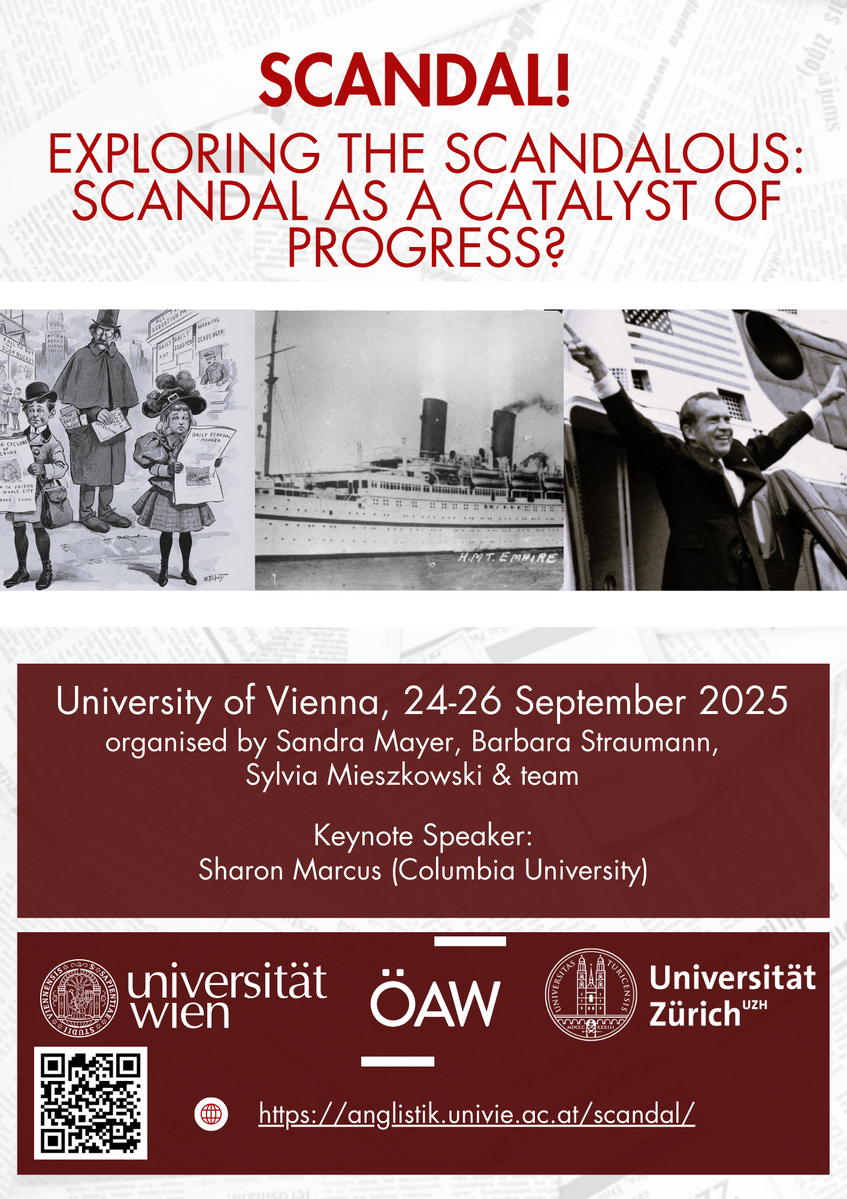S c a n d a l !
Exploring the Scandalous: Scandal as a Catalyst of Progress?
International Conference, 24th (evening) – 26th September 2025 (University of Vienna)
Deadline for proposals (500-750 words and a short list of references):
15th March 2025
Confirmed keynote speaker: Sharon Marcus (Columbia University)
Conference warming: 24th September 2025
Conference dinner with city councillor Cornelia Sucher: 25th September 2025
Conference fees:
* full fee: € 65
* reduced fee (PhD students): € 35
>>> Final P r o g r a m m e <<<
Call for Papers
The Greek word for the trigger-sensitive part in a trap which snaps shut when touched is "scandalon". For any modern understanding of a scandal, not only an exploration of its triggers and mechanisms is relevant, but questions such as "Who sees what?" and "What effect does 'being seen' have on intersectional power relations?" are crucial as well. For a scandal to occur, a moral system against which someone offends must be in place, as well as a community/an audience that finds out about it and cares enough to feel offended by the respective breach, which usually requires some media involvement. In our scholarly engagement with the production and impact of the scandalous, we might ask ourselves: What happens to a scandal when the moral system within which it first occurred changes? What happens when the respective legal system lags behind a society's moral code that has already changed? What happens when, in a social and cultural environment feeding on scandal, we stop caring altogether? What roles can and do the media play in informing and/or producing and/or manipulating the community that is necessary to create a scandal? It is tempting to stop at describing any given scandal, perhaps participate in the outrage it caused, or perhaps shake one’s head in incomprehension over the fact that an event caused a scandal at all. For the purpose of this conference, however, we are most interested in taking a look at the structures behind scandals in diverse Anglophone and/or German-speaking contexts of the 19th, 20th and 21st centuries, in order to explore their function as catalysts of change. Specifically, we would like to zoom in on their potential role as catalysts of change for 'the better', which of course presupposes a particular perspective that needs to be considered, perhaps exposed as biased and countered by different perspective/s.
Given that the academic publishing market is increasingly moving away from edited volumes and towards special issues in highly rated journals, we are adjusting the genre of the traditional CfP by asking for more detailed abstracts and streamlining them (as well as the potential talks and journal articles resulting from these abstracts). Thus, we aim to arrive at a coherent selection of 12 to 14 journal issue contributions (length tba).
Our conference's temporal frame encompasses the 19th, 20th and 21st centuries, whereas the transdisciplinary perspective will be limited to scandals from the Anglophone and the German-speaking cultural spheres, focusing on literary, (pop)cultural, social, political and economic contexts. We aim to approach an international, peer-reviewed journal (tba) that publishes articles in English with a plan for a special issue in which the contributions adhere to the same structure.
We would like each talk/finished article to name and/or outline the chosen scandal; mention the triggers (events, contexts etc.) that caused it; outline the participating discourses; discuss the media and/or institutions involved; characterize the relevant audience/s of the scandal; and discuss its effects and results.
This structure also determines what we are looking for in the abstracts. We expect them to answer the following questions to help us select a group that promises coherence as well as synergies: To which academic field does the proposed talk aim to contribute? What is the scandal (including key information such as dates and 'players', field, historical and socio-cultural context)? What is/are the key concept/s on which you will draw to theorise your chosen scandal or its underlying structures? Which discourses are central or peripheral to it? Who were the audiences of this particular scandal, and did they get involved in any form? For instance, did they form movements in the scandal’s wake? Which media and institutions created the audiences involved and sustained their attention? What changed after the chosen scandal? When did those change/s occur and within which contexts? What were the scandal's short-term and long-term effects? While we do not expect you to answer all of these questions, please try to address as many as possible.
Please add to your abstract a brief bio-bibliographical note (100 words) and your email address, and send it as an email attachment (.doc or .pdf) to all three conference organisers: sandra.mayer@oeaw.ac.at, barbara.straumann@es.uzh.ch, and sylvia.mieszkowski@univie.ac.at.

